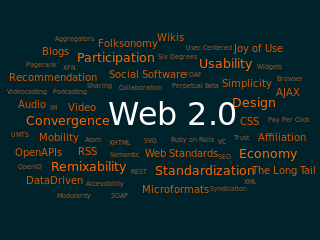
UserLand Software is a US-based software company, founded in 1988, that sells web content management, as well as blogging software packages and services.
In computer programming, create, read, update, and delete are the four basic operations of persistent storage. CRUD is also sometimes used to describe user interface conventions that facilitate viewing, searching, and changing information using computer-based forms and reports.
A trackback allows one website to notify another about an update. It is one of four types of linkback methods for website authors to request notification when somebody links to one of their documents. This enables authors to keep track of who is linking to their articles. Some weblog software, such as SilverStripe, WordPress, Drupal, and Movable Type, supports automatic pingbacks where all the links in a published article can be pinged when the article is published. The term is used colloquially for any kind of linkback.
The name Atom applies to a pair of related Web standards. The Atom Syndication Format is an XML language used for web feeds, while the Atom Publishing Protocol is a simple HTTP-based protocol for creating and updating web resources.

Web 2.0 refers to websites that emphasize user-generated content, ease of use, participatory culture and interoperability for end users.

Blosxom is a free-software weblog program written in Perl by Rael Dornfest. It uses the pre-existing file system instead of a database management system, unlike most blog software.
In blogging, a ping is an XML-RPC-based push mechanism by which a weblog notifies a server that its content has been updated. An XML-RPC signal is sent from the weblog to one or more Ping servers, as specified by originating weblog), to notify a list of their "Services" of new content on the weblog.
This is a list of blogging terms. Blogging, like any hobby, has developed something of a specialized vocabulary. The following is an attempt to explain a few of the more common phrases and words, including etymologies when not obvious.
Sam Ruby is a prominent software developer who has made significant contributions to web standards and open source software projects. In particular he has contributed to the standardization of syndicated web feeds via his involvement with the Atom standard and the Feed Validator web service.

Windows Live Writer is a discontinued desktop blog-publishing application that was developed by Microsoft and distributed as part of the Windows Live suite of apps. The last major release of Windows Live Writer came out in 2012 (end-of-life), and the software was completely discontinued in January 2017.
Web syndication technologies were preceded by metadata standards such as the Meta Content Framework (MCF) and the Resource Description Framework (RDF), as well as by 'push' specifications such as Channel Definition Format (CDF). Early web syndication standards included Information and Content Exchange (ICE) and RSS. More recent specifications include Atom and GData.
HCL Connections is a Web 2.0 enterprise social software application developed originally by IBM and acquired by HCL Technologies in July 2019. Connections is an enterprise-collaboration platform which helps teams work more efficiently. Connections is part of HCL collaboration suite which also includes Notes / Domino, Sametime, Portal and Connections.
The Facebook Platform is the set of services, tools, and products provided by the social networking service Facebook for third-party developers to create their own applications and services that access data in Facebook.

Google Wave, later known as Apache Wave, was a software framework for real-time collaborative editing online. Originally developed by Google and announced on May 28, 2009, it was renamed to Apache Wave when the project was adopted by the Apache Software Foundation as an incubator project in 2010.
In computing, Open Data Protocol (OData) is an open protocol that allows the creation and consumption of queryable and interoperable REST APIs in a simple and standard way. Microsoft initiated OData in 2007. Versions 1.0, 2.0, and 3.0 are released under the Microsoft Open Specification Promise. Version 4.0 was standardized at OASIS, with a release in March 2014. In April 2015 OASIS submitted OData v4 and OData JSON Format v4 to ISO/IEC JTC 1 for approval as an international standard. In December 2016, ISO/IEC published OData 4.0 Core as ISO/IEC 20802-1:2016 and the OData JSON Format as ISO/IEC 20802-2:2016.

An application programming interface (API) is a way for two or more computer programs to communicate with each other. It is a type of software interface, offering a service to other pieces of software. A document or standard that describes how to build or use such a connection or interface is called an API specification. A computer system that meets this standard is said to implement or expose an API. The term API may refer either to the specification or to the implementation.
Really Simple Discovery (RSD) is an XML format and a publishing convention for making services exposed by a blog, or other web software, discoverable by client software.
Micropub (MP) is a W3C Recommendation that describes a client–server protocol based on HTTP to create, update, and delete posts on servers using web or native app clients. Micropub was originally developed in the IndieWebCamp community, contributed to W3C, and published as a W3C working draft on January 28, 2016. As of May 23, 2017 it is a W3C Recommendation.

ActivityPub is an open, decentralized social networking protocol based on Pump.io's ActivityPump protocol. It provides a client/server API for creating, updating, and deleting content, as well as a federated server-to-server API for delivering notifications and content.
The JSON Meta Application Protocol (JMAP) is a set of related open Internet Standard protocols for handling email. JMAP is implemented using JSON APIs over HTTP and has been developed as an alternative to IMAP/SMTP and proprietary email APIs such as Gmail and Outlook. Additional protocols and data models being built on top of the core of JMAP for handling contacts and calendar synchronization are meant to be potential replacements for CardDAV and CalDAV, and other support is currently in the works.